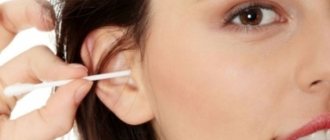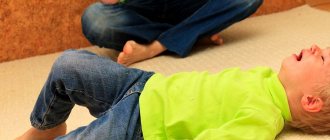Methods for treating swelling of the eyes
Treatment of swollen eyes in children is carried out depending on the established cause:
For allergic reactions, antihistamines are prescribed: Fenistil, Tavegil, Diazolin, etc. To avoid relapse of symptoms, further contact of the patient with the allergen must be excluded.
- For infectious diseases, depending on the etiology and clinical picture, antiviral agents or local antibiotics are prescribed: Ciprofloxacin, Levomycetin, Albucid, Floxal, etc.
- If a foreign object gets in, it is enough to carefully examine the affected area and remove the irritant. You can wash your eyes with weak tea to relieve redness of the mucous membrane.
- Treatment of barley involves hygienic procedures to avoid complications. You can’t squeeze out the purulent core, just wait until the stye ripens and breaks through on its own. You can make compresses on the affected eye from a decoction of chamomile, string and calendula. In addition, barley is a reason to strengthen your immune system.
- A chalazion usually goes away on its own, but it takes much longer than a stye. To avoid complications of this condition, antiseptic compresses are also indicated. If the chalazion does not go away for a long time and the lump becomes hard, your doctor may prescribe surgical removal. When chalazions appear repeatedly, on the same eye or on the other, this also indicates problems with the baby’s immunity.
INTERESTING: what to do if a child’s conjunctivitis does not go away?
For swelling of the eyes in children, it is not difficult to find an effective treatment, but if you have the slightest doubt about the cause of the phenomenon, it is better to consult a doctor. He will prescribe therapy, making an accurate diagnosis.
READ ALSO: causes of swelling under the eyes of a child and methods of treating swelling
In addition, sometimes it is enough to simply observe the child: red, swollen eyes can be the result of a banal violation of the regime (for example, if the baby does not get enough sleep) or excess salt in food.
Prevention methods
Children are not immune from inflammation of the conjunctiva or debris getting into the eye. Parents can reduce the risk of severe irritation of the cornea and mucous membranes if they adhere to a number of rules:
- make sure that the little one does not put dirty hands in his eyes;
- maintain hygiene regularly;
Newborn hygiene
- adhere to wakefulness and sleep patterns;
- they try to protect the baby from contemplating a working TV (monitor);
- find ways to protect the little one’s eyes from dust and debris during walks;
- select children's cosmetics and hygiene products taking into account the sensitivity of the body;
- Responsibly treat the diet of a nursing mother and the choice of products introduced into the baby’s menu;
- protect the baby from contact with animals from which the child can become infected with worms;
- treat colds in a timely manner so that rhinitis does not lead to inflammation of the eye mucosa;
- maintain the air humidity in the room where the baby is located at an optimal level.
Important! The main measure for preventing eye problems is regular examinations of children by specialists (pediatrician, neurologist, ophthalmologist, allergist).
Paying attention to your baby's health will help avoid discomfort caused by itchy eyes. If a problem occurs, do not fix it yourself. It is better to immediately show the little one to a specialist who will make the correct diagnosis and select therapy appropriate to the case.
Treatment with medications
It is recommended to resort to therapy with chemical drugs only after making a correct diagnosis. Depending on the nature of the disease, the child may be prescribed: antifungal or antibacterial agents, disinfectant solutions, antihistamines against allergies. Children with otitis are treated with drops with an anti-inflammatory effect.
Typically, if a small child scratches his ears after receiving the results of diagnostic tests, he may be prescribed the following treatment measures:
- To destroy ear fungus, antifungal ointments and creams are used. Miramistin and Exoderil are considered the drugs of choice in infancy. In addition to these, the baby is prescribed to take medications that improve intestinal microflora (probiotics).
- If allergic reactions are detected, children are recommended to take antihistamines. Suprastin and Diazolin have proven themselves well in pediatrics.
- Itching caused by otitis media can only be cured with antibiotics. Infants are usually prescribed Otipax or Flemoxin Solutab.
- Treating the parotid skin with antiseptic agents. Usually, if itching in the ears occurs in a baby, it is recommended to wipe the ears with peroxide or a weak solution of potassium permanganate.
Traditional methods
The washing procedure can be carried out using traditional methods, but you should not get carried away with self-medication, you can simply make the wrong diagnosis and begin to treat the wrong disease.
- Tea infusion. Place a gram of black tea brew on a glass of boiled 100-degree water and cover with a lid. Infuses for half an hour. The solution is filtered and used after cooling to wash the eyes.
- If your child constantly scratches his eyes, an infusion of marshmallow (rhizome) will help you. Place a teaspoon of powdered raw materials into a glass of boiled warm water. Leave to brew in a well-sealed container for approximately eight hours. The prepared product is filtered and used.
- Decoction of medicinal chamomile. Place a teaspoon of the plant's flowers in a glass of cold boiled water. Then you need to put it on low heat and cook for up to 10 minutes after boiling. After cooling, the solution is filtered.
- A decoction of medicinal eyebright. Add 2 teaspoons of dried plant to 300 ml of water. Then cook over low heat for approximately 5 minutes. After cooling, filter and use for washing.
Now you know what factors can provoke the occurrence of such behavior in children. If eye friction is an isolated incident, then there is no cause for concern. If it is permanent, most likely the baby experiences severe discomfort, possibly pain, and you cannot do without consulting a doctor. Remember that timely assistance significantly reduces the risk of complications and speeds up the treatment process.
Treatment
If parents manage to figure out why the child is rubbing his eyes or nose, eliminating the problem is usually not difficult. When the cause of the reaction is an external irritant (dust trapped under the eyelid or an allergen in the immediate vicinity), it is enough to remove the harmful factor so that the baby instantly feels better.
It’s another matter when itching occurs as a result of a disease. Treatment in this case will be medicinal, and what kind of drugs (antibacterial, anti-inflammatory or anti-allergenic) to give the child will be decided by his doctor, based on the nature of the illness affecting the baby.
This treatment will be symptomatic
For its effectiveness, it is important to know why exactly the child itches. When the cause of itching is a bacterial infection, you can resort to help:
- Table salt solution. To prepare it, take 1 teaspoon of salt per glass of boiled water, then stir the liquid until smooth. The resulting solution is used for daily rinsing (including preventive). Such procedures are effective in combating itching and irritation of the skin around the eyes and nose.
- Aloe vera juice. It is used in combination with honey (the ingredients are mixed in a 1:1 ratio). The resulting product is used for washing, after diluting it with boiled water. In addition to bactericidal, aloe has a moisturizing and anti-edematous effect.
If you notice itching in the nasal area in your child, you should take care to consult a doctor in a timely manner. Only he will help identify the problem and prescribe the appropriate course of treatment. It depends on the pathogen and may involve the use of a large number of medications, including antibiotics.
If a child scratches his nose and the itching is caused by an allergen, then it is necessary to protect the child as much as possible from further exposure to it, and also to destroy it in the body. Antihistamines are best for this. In addition, a properly selected diet will help the child get rid of unpleasant sensations.
If a child’s nose is constantly itchy and the cause is an infectious disease, vasoconstrictors, nasal ointments and creams, and antiviral drugs are used to treat it.
When to take action
If your baby scratches his eyes while feeding or after a walk, it's time to put him to bed. In all other cases, it is necessary to find out the cause of the itching and try to eliminate it.
The selection of eye drops, ointments, antihistamines and other drug treatment is the prerogative of the doctor. Household members can only provide all possible assistance before contacting a specialist:
- It is advisable to remove any speck that gets into the eye immediately. To do this, the mother takes the following actions:
- washes his hands first;
- then washes the child's face;
- taking warm boiled water into a pipette, rinses the little one’s eyes;
- Taking a sterile napkin or cotton swab, use it to remove the foreign body.
How the eye is processed
Important! If an object caught in a child's eye is inaccessible, there is no need to make efforts to remove it. In this case, it is better to seek help from a specialist.
- Measures should be taken immediately when a crust appears in the corners of the baby's eyelids. It is removed with a sterile damp cotton swab.
- For dry eye syndrome, the air in the room is humidified using a special device or by placing containers of water in the room. The child is provided with plenty of fluids, and the eyes are washed with chamomile decoction.
- A compress made from tea bags helps relieve irritation.
If it is difficult to protect the baby’s actions and he continues to pull his hands towards his eyelids, it is advisable to put mittens on his fists. This way, the child will not be able to injure his eyes with his nails and will not introduce an infection into them.
The first measures that a mother should take to relieve itching in her baby’s eyes are not a reason to continue self-medicating. Having provided the little one with all possible help, they immediately go with him to the doctor or call the local pediatrician at home when the baby is in a feverish state.
How to deal with itchy scalp: shampoos, medications and folk remedies
Any parent is responsible for the life and health of their son or daughter, so if there are any dangerous signs of the disease, you should consult a doctor. Parents can give medications to their child without visiting a pediatrician only if they have already encountered such a problem. For itching, different remedies are used:
- For lichen, ointments and gels with clotrimazole and miconazole are often prescribed.
- To combat dandruff, pine oils are used in moderation, along with Styx and T-Gel shampoos, which are safe for babies. It is convenient to use strong decoctions of chamomile or calendula.
- For fungal infections, Griseofulvin is used, a drug that is safe for the child’s body.
- For the treatment of allergic manifestations, medications are prescribed by the doctor. Against severe itching, parents can only give more water, Diazolin and a calcium glucanate tablet, since the cause of many atypical reactions is precisely the lack of calcium in the body.
If a child constantly scratches his head, it is up to the parents to cope with the manifestations, and not the causes of the itching. It can be eliminated if you start washing your hair with tar or laundry soap, completely abandoning shampoo. Such therapy is also prescribed for demodicosis. The scalp will be soothed by herbal masks that can be made with chamomile, sage, plantain and mint. And burdock oil will not only reduce itching, but strengthen hair and become an excellent preventative against lice.
https://youtube.com/watch?v=JHLHc5XyHDw
The child constantly scratches his nose
- 1
- 2
- 3
- 4
- 5
(1 vote, rating 5.00 out of 5)
Due to weak immunity, children can develop serious diseases in a short time, so parents need to closely monitor the health of their baby. In case of the slightest disturbance in the functioning of the body, it is better to immediately consult a doctor. If your child constantly scratches his nose, you should think about whether everything is okay. The cause of itching can be various factors, which you can read about in more detail below.
How should parents behave?
If a newborn baby sleeps without closing his eyes, it is necessary to show him to the following doctors: (see also: why does a newborn baby not sleep at night?)
READ ALSO: Why does a child sleep with his mouth or eyes open?
- ophthalmologist;
- neurologist;
- neuropsychiatrist.
Specialists will be able to determine whether there are any abnormalities in the development of the newborn and possible health problems. Parents themselves can try to create conditions for healthy sleep for the baby.
To do this, you need to carry out the following procedures:
- When bathing your baby, add mint decoction to the water;
- keep the room quiet;
- Put your baby to bed at the same time every day.
For older children, it is recommended to read a story before bed to help the child relax and fall asleep faster. Try to protect your baby from stress and emotional tension.
Often, a baby's sleep is disturbed due to emotional instability, the development of which is facilitated by various factors. Constant quarrels between adults, stress and lack of sleep adversely affect a baby's sleep. In order for your baby to have a healthy sleep, there should be peace and quiet in the house.
Therapy: basic principles
Treatment for itching in the eyes and simply their constant rubbing depends on the factors that caused the development of this phenomenon. The doctor may prescribe antibacterial, restorative, vitamin supplements, antihistamines, antiviral drugs, antiseptics, and diet.
If you have poor sleep, correcting your daily routine and taking frequent walks can help. Rinsing and instillation will be useful in any case.
How to do rinsing
Eye rinsing eases the condition of allergies; in case of a foreign body or conjunctivitis, they are mandatory. Procedure:
- Place the baby on the bed or changing table, and place the older baby in front of you.
- Take the prepared solution - it should be at room temperature. Soak a cotton swab or pad in it, gently rub it over the eye, especially carefully treat the corners where discharge accumulates. You can use a pipette for rinsing - the product is drawn into it, which is then gently dripped into the corner of the eye. The pipette should be disinfected after each use or a new one should be taken.
- Wipe your eye with a cloth soaked in clean boiled water.
If the child resists, shakes his head, or hits his arms, ask someone to help you carry out the procedure. The same goes for eye drops.
Burying
If your doctor has prescribed eye drops, they will need to be used 2 to 6 times a day, depending on the instructions. Preliminary rinsing is done - every time or whenever possible. Wash your hands and keep your nails short. No need to use gloves.
Warm the bottle with drops in your hands first, especially if it was previously in the refrigerator. If the baby is naughty, distract him, come up with a magical story about droplets handed down by a forest fairy or something like that.
It is necessary that the child does not struggle or cry, because this negatively affects the results of the procedure (you may not get into the eye, the drops will flow out along with the tears, etc.).
If the bottle does not have a dropper, use a pipette - its tip should be sterile. When there is neither a dropper nor a pipette, take a syringe without a needle - it is difficult to dose the product with it, but it is possible, do not take too many drops so as not to drip too much.
Before the procedure, the child’s head must be carefully tilted back; infants are held with both their head and hands so that they do not pull out (an assistant is needed). Newborns can also be swaddled, the main thing is to immediately remove the diaper after the procedure. Pull back the lower eyelid, place a drop of the product in the corner of the eye, try not to touch the mucous membrane and release the eyelid. To prevent the medicine from flowing out, hold the corner of your eye for at least 30 seconds, you can do a light massage.
Folk remedies
If a child often rubs his eyes, in the absence of serious symptoms, folk remedies can be used for preventive purposes:
- Infusion of tea leaves - it is best to use black leaf tea; you need to infuse it for about half an hour. Use it warm to wash your eyes;
- Marshmallow helps with itchy eyes. Take a spoonful of ground raw material into a glass of boiled water, let the powder brew, strain and use topically;
- Chamomile – take a teaspoon of dry herb in a glass of water, simmer over low heat, let cool and strain. The product perfectly soothes the eyes and can be used in the complex treatment of allergies;
- Eyebright - a couple of spoons of the plant per 300 ml of boiled water, pour boiling water and boil for several minutes, cool.
Why does my baby have a stuffy nose?
If a baby has a stuffy nose, this does not always indicate an inflammatory process in the body. Could the cause be physiological rhinitis? What is it? The nasal passages in children at this age are not yet fully formed and are too narrow.
In newborn babies, a large amount of mucus accumulates in the nasal sinuses. It dries out and forms crusts on the nose. This interferes with the baby's normal breathing. There should be no temperature and no other signs of a cold either.
In order to get rid of this problem, you need to regularly moisturize your baby's nose. This can be done using special solutions or sterile Vaseline.
If there is a fever, runny nose and watery eyes, then this may be the beginning of an inflammatory process in the body. In this case, it is necessary to urgently consult a doctor, since it is impossible to make a diagnosis on your own. Especially a small child.
Baby rubs his nose all the time: possible reasons, what parents should do
Itching in the nose is an obsessive condition that causes discomfort and is accompanied by sneezing, mucous discharge, lacrimation or swelling of the mucous membrane. The appearance of itching in the nose can be due to external and internal reasons.
Child scratches his nose
Causes of itching in the nose
There are a number of the most common reasons why a child’s nose is constantly itchy. They are characterized by features of manifestation and additional symptoms.
Pathological processes
Causes of itching in children may include:
- Infectious diseases. This is, for example, influenza, ARVI. In addition to itching, increased body temperature, weakness, and decreased appetite are observed;
- Fungal infections. This is most often mycosis and candidiasis. If the child also sneezes, then most likely he has a fungus;
- Inflammatory disease. At the same time, the baby’s breathing becomes more difficult, the temperature rises, and he may scratch the wings of his nose.
The girl has a runny nose and itchy nose
Situations when you shouldn't worry
Why does an infant groan constantly?
If a child scratches his nose, this may be due to situations that do not require drug therapy, since they go away on their own as the provoking factor is eliminated.
Reasons contributing to the development of this symptom:
- The influence of high and low temperatures;
- Dry indoor air initially causes itching in the nasal passages, which subsequently leads to repeated sneezing;
- A bad environmental situation can cause a runny nose in a child, while adults do not experience discomfort due to the fact that they have adapted to this situation;
- Penetration of water during bathing or cosmetic products;
- The eruption of a baby's first teeth is often accompanied by itching in the nose and visual organs, which can cause him to constantly wake up.
Warning signs
Why does my child constantly cough for no reason?
Despite the fact that diseases that cause discomfort and itching in the nasal passages have different origins, their clinical picture has similar symptoms. It manifests itself this way:
- An increase in body temperature appears;
- The secretion of mucus from the nasal passages increases;
- Sleep is disturbed;
- The baby has an earache;
- Crusts form, the child wants to constantly scratch his nose;
- Skin rashes appear that cause pain and are very itchy;
- A headache occurs, the baby begins to cry a lot.
The girl has a runny nose and a cold
What to do to fix it
Having understood the cause of the itching and why the baby rubs his nose, it is easy to determine a list of measures to eliminate it. General recommendations include minimizing the influence of provoking factors: eliminating the allergen, contact with dust, smoke, cold, dry air. At the same time, drug correction is carried out.
For allergic rhinitis, medications are prescribed in the form of drops or sprays:
- Antihistamines;
- Cromony;
- Corticosteroids;
- Decongestants;
- Saline solutions.
Rinsing a child's nose
When to see a doctor
In addition to the feeling of itching itself, a number of other symptoms are most often present. The child may experience burning, pain and tingling in the nose and on its wings, throat congestion, runny nose, redness and swelling of the mucous membrane of the nose and mouth.
Characteristic symptoms also include allergic rashes, sneezing, watery eyes, increased body temperature, coughing, and mucus discharge from the nasal passages.
In order to receive treatment, you must contact a therapist, allergist, or otolaryngologist.
How to relieve itching yourself
A burning sensation is rarely associated with something serious; most often it is a sign of an allergy or an incipient runny nose. You can reduce the severity of the symptom:
- Rinse the nose with saline solution;
- Maintaining sufficient humidity in the children's room;
- Softening crusts;
- Warming the nose and sinuses (only if there is no fever);
- The use of vasoconstrictor drugs.
Important! If symptoms worsen, you should stop using any medications and consult a doctor.
Disease Prevention
To protect your child from an itchy nose, you should adhere to the following rules:
- Monitor the baby's hygiene. Fungal and skin diseases develop quite quickly, so you should always be on guard.
- Monitor your baby's diet and immunity.
- Regularly ventilate the room and perform wet cleaning.
- Spend more time outdoors. Doctors recommend that both children and adults spend at least 1.5-2 hours walking.
- Use special gauze bandages on the street during the peak of ARVI, especially in crowded places and public transport.
- For prevention, you can use special solutions for rinsing the nose. This will instantly get rid of possible allergens and protect the child.
- An optimal level of humidity must be maintained in the room.
Itchy nose is a fairly common problem that many patients face. The cause of the symptom can be various conditions: from fairly banal and easily removable to serious chronic pathology. Therefore, to resolve the issue, you should always seek help from a doctor.
Source: https://kpoxa.info/zdorovie-pitanie/rebenok-postoyanno-cheshet-nos.html
Child scratches his nose
If your child scratches his nose for no reason, then in most cases this indicates two reasons.
The first is the baby’s early nervousness, which is the background for the development of neuroses. Children with increased excitability at an early age are prone to hyperactivity, anxiety and various manifestations of nervousness such as biting their own body parts, biting nails, banging their heads on the crib, and so on. In this case, the child may involuntarily rub his eyes or nose.
The second reason why a child may scratch his nose is allergies and helminthic infestation. If a child scratches his nose, has a fever, refuses to eat and sleeps poorly, it is necessary to contact a specialist for a professional diagnosis.
Lagophthalmos in children
This condition manifests itself in the form of discomfort and dry eyes. If lagophthalmos does not go away for a long time, it can provoke the development of ulcerative keratitis, conjunctivitis and other inflammatory processes of the eyes.
Lagophthalmos may occur in children in the following cases:
- If the facial nerve is inflamed. At the same time, the muscles of the eyelid are irritated, its functions are disrupted, which is why the eyes may remain slightly open when the baby sleeps.
- In congenital conditions of underdevelopment of the eyelids. This is the most common factor in the development of lagophthalmos in children.
- With cicatricial eversion of the eyelids.
- With the development of exophthalmos.
- When the disease of the parotid salivary gland turned into inflammation of the nerve.
INTERESTING: why does a newborn roll his eyes upward when he falls asleep?
Such phenomena are often observed in children and disappear as they grow older. There is no evidence, but there is an opinion that during REM sleep a person’s eyelids can be open, but during deep sleep they close. A child can inherit lagophthalmos from his parents.
Mom and dad should worry when the child’s eyes do not close completely at night. In this case, seek advice from a pediatric ophthalmologist and neurologist.
How to properly treat children's eyes
Basically, the causes of eye redness are not so serious as to require hospitalization of the child. In order to eliminate these unpleasant symptoms, it is enough to eliminate minor factors, such as: specks or prolonged exposure to the sun, or redness after watching TV.
Like any procedure, eye washing also has its own rules, namely:
- It is allowed to wash your eyes after bathing.
- The child should not be restless during the procedure.
- Rinsing must be done in a lying position.
- For disinfection, you can use a weak solution of potassium permanganate.
- The solution should be warm.
- You need to rinse your eyes with your eyelids closed.
- After the procedure, the baby must lie down for 10 minutes.
- If the baby's eyes are too sensitive and often irritated, this procedure must be carried out every evening after bathing.
- For rinsing, you must use a clean cotton pad.
- After the procedure, it is necessary to dry the skin with pointed movements so that the baby does not experience discomfort.
In order to prevent the development of such symptoms, it is necessary to teach your child from childhood not to touch his eyes with dirty hands, and also to observe the rules of personal hygiene. If swelling of the eyes quickly spreads to the entire face, it is necessary to call an ambulance and urgently hospitalize the baby.
Signs of absence of pathology
It is considered normal if children rub their eyes in the morning after sleep or, conversely, before going to bed. Adults often behave this way, but they don’t pay attention to this fact. The behavior is completely unconscious and indicates severe fatigue. However, parents should be concerned about the situation when redness begins to appear around the organs of vision. Mechanical action leads to blood flow to the eyelids.
A newborn baby's skin has a high degree of tenderness. Frequent contact with it increases the risk of scratches and wounds. If an infant rubs them frequently, the damage does not have time to heal. The risk of secondary infection also increases. Harmful viruses and bacteria can penetrate into the skin through wounds. The situation can be prevented by putting special gloves on the baby’s hands at night.
A baby may experience discomfort after bathing if foam or soap gets on its mucous membrane. Minor irritation is not dangerous and will subside within a few hours. If you find a speck in your eye, it is best to gently rub it or rinse it with water. After the manipulation, the discomfort will completely disappear.
Causes of itching in the nose area in children
If you notice that your child's nose often itches, do not panic. The reason may be quite trivial - a hair or any other small foreign body.
Most often, itching in the nose in children occurs as a result of allergies to certain substances. To make sure that this is the reason, you need to take a blood test or a prick test. This will allow you to quickly identify the allergen. In most cases they are:
- dust mites;
- animal hair;
- mold;
- plant pollen;
- certain products.
In addition, a child’s nose may itch due to the presence of strong odors. Children's bodies are quite weak, so any negative impact can have a strong impact.
Also among the causes of itchy nose in children may be:
- infectious diseases. It could be the flu, ARVI. In addition to itching in the nose area, there is increased body temperature, weakness, and decreased appetite;
- fungal infections. This primarily applies to diseases such as mycosis and candidiasis. To protect your child from their appearance, you should closely monitor hygiene. If, in addition, the child also sneezes, then most likely he has a fungus;
- inflammatory disease of the nose. At the same time, the baby’s breathing becomes more difficult and the temperature rises. In such cases, you cannot delay treatment, otherwise serious complications may arise.
Itching in the nose area can also be caused by dry air. Because of this, the mucous membrane dries out and becomes more sensitive to various external factors.
Why is itching in the eyes and nose dangerous?
If a toddler not only rubs his eyes, but also has a stuffy nose, this is an alarming situation. Allergic rhinitis can appear in the first month of a child’s life. Not all parents are able to immediately recognize the problem, so the baby is first treated for ARVI.
When a child's eyes itch due to allergies, all the mucous membranes swell. Therefore, the nasal sinuses and the upper region of the larynx are involved in the process. Increased friction of the eyelids provokes copious secretion of tears. Some of the fluid leaks out through the sinuses, which are already clogged. All this makes breathing difficult and can provoke asthmatic syndrome.
Conjunctivitis is often of an allergic nature and is manifested by a severe burning sensation in the eyes. The child has to constantly scratch his eyelids, which leads to damage to the mucous membrane. As a result of disruption of the protective film, the conjunctiva becomes infected and the hair follicles become inflamed.
Advanced inflammation
Note! If purulent discharge appears in the corners of the eyes, we can talk about an advanced infection that was not paid attention to in a timely manner. In severe cases, the problem can develop into uevitis, blepharitis and even loss of vision.
Why does the baby scratch its body (ear, eyes, head, nose)
Many mothers often notice how their baby scratches certain parts of the body and begin to come up with a number of problems for themselves.
She immediately thinks about some serious illness, stresses herself out and starts going with the child to all possible doctors.
There is another category of mothers who do not pay any attention to such trifles and simply miss the moment when a serious illness can begin to develop precisely from irritation of any part of the body that the baby actively begins to scratch. The error is made in both the first and second cases
This article will tell you in what situations it is necessary to pay attention to the fact that a child is scratching his eyes, ears, nose and mouth.
Baby rubs his eyes
Many children under 1 year of age have poor control of their body movements. Everything happens reflexively, and therefore in cases where the baby wants to sleep and starts rubbing his eyes, there is no need to worry. This is a normal body movement, which at some points is inherent even in an adult.
It is in this case that children's doctors strongly recommend monitoring the length of the child's nails and the cleanliness of his hands, since with long, sloppy nails, the baby can simply scratch himself.
Another significant reason why a child rubs his eyes is an allergic reaction. The baby’s weakened and extremely susceptible immune system reacts quite sharply to external and internal irritants of the mucous membranes.
Allergens for a child can be:
- Dust and plant pollen.
- Pet hair.
- Household chemicals and any decorative cosmetics.
- Food.
- Insect bites.
A dangerous reason why a baby rubs his eyes may be conjunctivitis. This is an irritation of the mucous membranes of the eyes, which occurs due to the ingress of bacteria, viruses or allergens.
Depending on the causative agent of this disease, conjunctivitis is classified. Only an experienced doctor can distinguish and identify a specific type of conjunctivitis during an examination and testing.
He is also able to prescribe competent treatment for the baby.
Child scratches his nose
If your child scratches his nose for no reason, then in most cases this indicates two reasons. The first is the baby’s early nervousness, which is the background for the development of neuroses.
Children with increased excitability at an early age are prone to hyperactivity, anxiety and various manifestations of nervousness such as biting their own body parts, biting nails, banging their heads on the crib, and so on. In this case, the child may involuntarily rub his eyes or nose.
The health of the baby is the most important thing for every parent.
Concerned mothers and fathers always pay attention to the slightest changes in the behavior of their beloved child, so even seemingly ordinary eye scratching can become a cause for concern. Allergic reaction
If parents are worried about why their child is scratching his eyes and nose, it is worth analyzing the child’s diet and environment.
Allergic reaction. If parents are worried about why their child is scratching his eyes and nose, it is worth analyzing the child’s diet and environment.
Often, severe allergies in children appear against the background of the flowering of a plant. This becomes especially noticeable in spring or summer.
In addition, the cause of itching can be pets living at home or, simply, household dust.
The presence of speck in the eye. Very often, redness or itching can be caused by the presence of a foreign body, in particular a speck of dust or a grain of sand. To save your child from this, you need to thoroughly rinse your eyes with tea leaves or boiled water.
It happens that a baby rubs his eyes simply from overwork or overexertion. Behind
Source
Well, how not to scratch the place that itches? This is an absolutely natural reaction of any small child, and the eyes are no exception.
When a child's eyes itch, he wants to stop this unpleasant sensation and begins to reflexively scratch or rub them.
Today we will talk about why this happens, and whether the habit of rubbing your eyes is always harmless.
Symptoms of eye irritation
To understand the reasons why a child’s eyes itch, you need to pay attention to the following points:
- how often does the child do this, what efforts does he make;
- is it related to sleep or not;
- whether it is accompanied by other symptoms.
If itchy eyes are not caused by muscle strain, then any irritation is necessarily accompanied by additional symptoms. Their combination will help determine what exactly makes the little one pull his hands to his eyes.
Characteristic symptoms
| Possible reasons | Signs of irritation accompanying itching |
| Foreign body | The presence of a foreign object in the eye is indicated by: • profuse lacrimation; • frequent blinking; • mucus in the corner of the eye |
| Infection | The child’s eye not only itches, but also hurts. Therefore, the little one is overly capricious and will cry all the time. The following symptoms are added to the itching: • red swollen eyelids; • profuse tears; • presence of pus; • fever |
There's a speck in my eye
If irritation of the eye mucosa is caused by ophthalmological problems, diseases of the endocrine, digestive or nervous systems, other symptoms may appear:
- bright circles around the objects in question;
- double vision or blurred vision;
- "blind" viewing areas.
It is impossible to notice these signs from the outside, and a little person will not be able to tell about them until he is a year old. Therefore, to avoid serious problems, your little one should be shown to a specialist at the first sign of eye irritation.
Diagnosis and treatment of seasonal rhinitis
“My nose and eyes itch and I sneeze, what should I do?” - this is a question many people ask during the flowering period of plants. To get rid of discomfort, you need to contact specialists - an otolaryngologist and an allergist. Doctors recommend undergoing laboratory tests and x-rays of the sinuses. In addition, you need to do tests and find out which substance provokes individual intolerance. Therapy is carried out under the supervision of a doctor. The most important thing in treatment, judging by the advice of allergists, is to eliminate allergens from your environment. If this is not possible, the patient is recommended to use drugs with antihistamine properties and anti-inflammatory drugs. They are able to eliminate the symptoms of hay fever.
In addition, in some cases, immunotherapy has a good effect. A solution of a substance that causes individual intolerance is injected into the patient’s subcutaneous tissue. With each procedure, the concentration of the allergen is increased. Thus, the patient’s body gradually adapts to it. However, this method cannot be used in case of exacerbation of the disease.
Dermatological diseases
The following reasons why a child’s nose itches are dermatological pathologies.
Infections cause severe irritation of areas of the skin where microorganisms are present. Most often, itching in a child’s nasal cavity is caused by the following diseases:
- eczema of the nose (characterized, among other things, by severe burning and pain when a foreign object is inserted into the nostril);
- sycosis of the nose (a pathology in which bacteria attack the hair follicles. Most often it occurs due to previous injuries that were not properly treated);
- dermatosis (this disease is genetically determined and is characterized by the sensitivity of the epidermis to microflora);
- scabies (occurs relatively rarely, and the causative agent is scabies mites).
Self-treatment of any of the above pathologies is meaningless and even harmful. Only a specialist can accurately diagnose the disease. Therefore, the answer to the question: a child’s nose itches, what to do, in this case, a visit to the doctor.
And, of course, itching and sneezing can cause colds. With such an infection, the human body reacts by producing large amounts of mucus, which irritates the nerve receptors located in the nose. But the main thing is that bacteria settle in the corresponding cavity. In the process of their life, they produce waste, which, in turn, is highly acidic. Nerve endings react sharply to acid and tell the brain that they are being negatively affected. As a result, sneezing occurs, and in parallel with it, an unpleasant itching is felt. In cases of a cold or especially the flu, you should definitely seek help from a doctor. Children's immunity is not yet developed enough, so it is unlikely that the child will be able to cope with the infection on his own. Folk remedies may also have an insufficient effect for complete recovery.
Why your nose itches: common causes in children and adults
Probably everyone is familiar with such an unpleasant sensation as an itchy nose. A painful symptom disrupts habitual activity, is accompanied by other disorders and requires prompt elimination. Why your nose itches and how you can get rid of the itching needs to be considered in more detail.
Causes of itching inside and outside
At its core, itching is a disturbance of sensitivity. It occurs under the influence of chemical stimuli that irritate specific receptors (pruriceptors) in the skin and mucous membranes. The mechanism for the development of itching is most often associated with histamine, but other substances also act in a similar way:
- Amines (serotonin, dopamine, adrenaline).
- Proteases (kallikrein, tryptase, papain).
- Eicosanoids (prostaglandins, leukotrienes).
- Neuropeptides (bradykinin, neurotensin, substance P).
- Cytokines (interleukins, tumor necrosis factor).
The most common exogenous cause of itching is allergens inhaled. They can be of plant (pollen, odors), animal (wool, fluff), or household (detergents, cosmetics) origin. A runny nose with itching in the nose often accompanies hay fever and food allergies.
Sensitive fibers are irritated under the influence of various external factors - dry air, smoke and dust, chemical aerosols. Among ENT pathologies, the cause of an unpleasant symptom may be:
- Rhinitis (acute and chronic).
- Nasal polyps.
- Foreign bodies.
- Tumors.
Systemic diseases that provoke its occurrence include endocrinopathies, liver and kidney dysfunction. Severe itching can occur without any connection with organic causes - under the influence of stress factors (psychogenic).
Itching on the outside of the nose deserves special consideration. It usually occurs with insect bites, sunburn, and is part of the structure of skin pathology (atopic and contact dermatitis, eczema, dermatomycosis, scabies, itchy dermatoses). All these conditions must be excluded during differential diagnosis.
Itchy nose is a common symptom, most often caused by allergic and inflammatory processes.
What causes a cold?
The desire to scratch your nose can arise not only due to allergies, but also under the influence of the inflammatory process. Respiratory diseases are caused by viruses and bacteria that can produce toxins and provoke immune reactions with the release of inflammatory mediators. These substances irritate the pruriceptors of the nasal mucosa.
Why does my child constantly scratch his face?
Parents who notice that their child is almost constantly rubbing or scratching his nose may become justifiably alarmed. Indeed, this is how an allergic reaction can manifest itself, for example, to a new product introduced into the diet, or a cream.
Redness and rashes on the skin add confidence to this. But there are also simpler reasons, in particular, dry skin.
Cold wind in winter and hot air in the apartment quite often contribute to dehydration of the delicate children's epithelium and the appearance of itching.
Characteristics of symptoms
The source of the problem can be assumed from the clinical symptoms identified during a medical examination. Itching is a subjective symptom, but even its characteristics can clarify something. You need to find out the following features:
- Localization - inside or outside, on one or both sides of the nose.
- Distribution – local or covering several anatomical zones.
- Severity – intense, moderate or weak.
- Duration and frequency – short-term or long-term, periodic or frequent.
- Dependence on external and internal factors - contact with allergens, cold and dry air, intake of certain foods, emotional stress, etc.
Anamnestic information – the time and circumstances of onset, the nature of the course, previously taken actions – acquires considerable importance in the diagnostic search. It is important to pay attention to accompanying symptoms, because they sometimes provide much more information about the pathology than just itching.
Frequent sneezing and red eyes
For those who have a very itchy nose, the first thing to consider is allergic rhinitis. This is a type of vasomotor rhinitis that occurs as a result of sensitization of the mucous membrane to various substances. The clinical picture consists of the following symptoms:
- Paroxysmal sneezing.
- Copious watery discharge (rhinorrhea).
- Difficulty in nasal breathing.
- Decreased sense of smell.
In this situation, not only the nose, but also the eyes may itch - with the development of lacrimation, redness of the conjunctiva and sclera. Long-term allergic rhinitis may be associated with atopic dermatitis and bronchial asthma.
Allergic rhinitis is perhaps the most common source of nasal itching. But we must not forget about other reasons.
Runny nose in one nostril
Symptoms localized to only one side of the nose may indicate inhalation of foreign substances through that particular nostril. In childhood, such a situation requires the exclusion of a foreign body. Once in the nasal cavity, it immediately causes a response:
- Discomfort.
- Sneezing.
- Tearing.
- Serous discharge.
But already on the first day these signs disappear, and for a long time the child may not show any complaints at all.
But around the foreign body, the mucous membrane becomes inflamed, which is accompanied by one-sided congestion, serous-purulent discharge (sometimes mixed with blood), redness and maceration of the skin under the nose.
Some foreign bodies undergo calcification, turning into rhinoliths.
Itchy tip skin
The skin of the outer nose, especially the tip, may also itch. This is observed in allergic rhinitis or dermatological diseases. Eczema of the nasal vestibule can be determined by the polymorphism of skin manifestations:
- Redness, swelling, itching and burning.
- Papules, vesicles, erosions, weeping.
- Crusts, scales, scratching, lichenification.
In the initial stage of the disease, itching can be so intense that it disturbs sleep and leads to the development of neurotic reactions. Chronicization of the process is accompanied by thickening of the skin, areas of increased dryness, and cracks.
Diagnosis of pathology
It is possible to establish the exact cause of the disorders with a comprehensive diagnosis. In addition to a clinical examination with anterior and posterior rhinoscopy, the results of additional methods may be needed:
- Complete blood count (leukocyte count, ESR).
- Blood biochemistry (immunoglobulins E, glucose, liver and kidney tests).
- Tests with allergens (skin, inhalation).
- Endofibroscopy of the nasal cavity.
- Radiography.
- Tomography.
The examination plan is established by the ENT doctor on an individual basis. If necessary, related specialists are involved: allergist, dermatologist.
A patient with an itchy nose needs a comprehensive diagnosis that can take into account all aspects of the development of a specific pathology.
What should I do to fix it?
Having understood the cause of itching, it is easy to determine a list of measures to eliminate it. General recommendations include minimizing the influence of provoking factors - eliminating the allergen, avoiding contact with dust, smoke, cold, dry air, etc. At the same time, drug correction is carried out. For allergic rhinitis, medications are prescribed in the form of drops or sprays:
- Antihistamines (Allergodil).
- Cromony (Cromoglin).
- Corticosteroids (Flixonase, Avamys, Nasonex).
- Decongestants (Evkazolin, Nazivin).
- Saline solutions (Aqua Maris, No-salt).
The detected foreign body must be removed, and the accompanying inflammatory process is suppressed with antimicrobial agents (Bioparox, Isofra).
External treatment of nasal eczema involves lotions with antiseptics, the use of antibacterial agents and hormonal creams.
Systemic therapy for intense itching is carried out not only with antihistamines, but also with sedatives and immunocorrectors.
Itchy nose is a fairly common problem that many patients face. The cause of symptoms can be various conditions, from fairly banal and easily removable to serious chronic pathology. Therefore, to resolve the issue, you should always seek help from a doctor.
Source: https://elaxsir.ru/simptomy/drugie/pochemu-cheshetsya-nos-rasprostranennye-prichiny-u-detej-i-vzroslyx.html
What to do if your child rubs his eyes
In general, the scheme is clear: you need to carefully examine the eyes and try to rinse them if something gets into the eye. The same should be done if pus forms in the eyes. Once again, when a child scratches his eyes, the infection can spread further, so you need to monitor this habit.
It is best to have saline solution or “Artificial tear” drops in your home medicine cabinet - washing with them does not cause any unpleasant sensations. A weak solution of furatsilin or chamomile is another acceptable option. Do not use bandages or gauze for wiping - their particles can easily get into the eye and cause irritation. It is better to wipe the baby's eyes with sterile cotton pads, different for each eye.
Among the medications, it is worth having tetracycline eye ointment and chloramphenicol drops at home as first aid for eye inflammation. But treatment must still be prescribed by a doctor. If your child is rubbing his eyes because of an allergy, you can give him an antihistamine that your pediatrician previously recommended.
If, along with the fact that your eyes are itching, there is redness, swelling, increased tearing and purulent discharge, you cannot do without a visit to the doctor.










